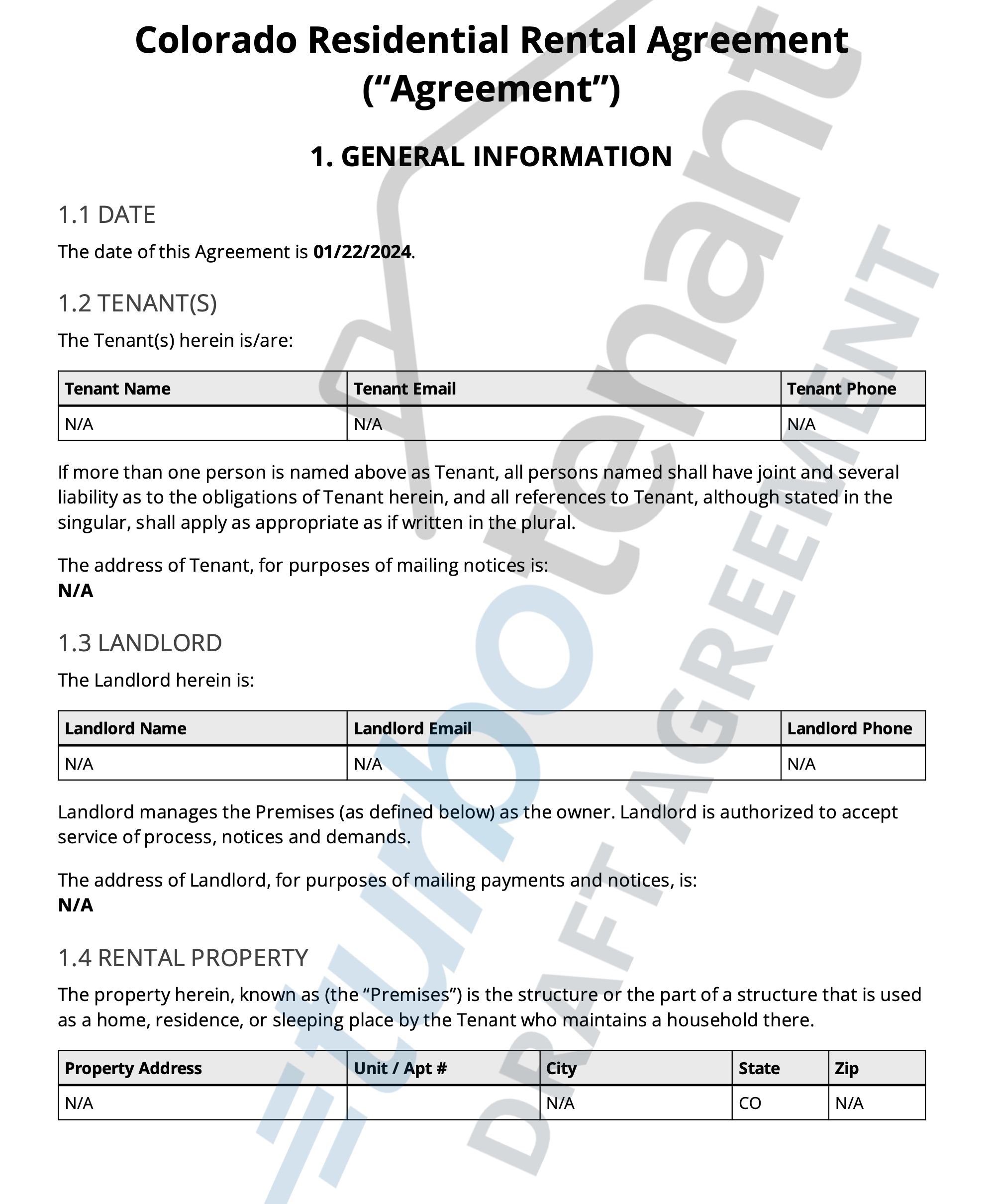Key Take Aways
- Personalization and Compliance: The lease is designed to include tenant and property-specific details for personalization and legal compliance. Additional unique provisions should be reviewed by a lawyer.
- State-Specific Regulations: It contains editable Colorado-specific clauses with a recommendation for legal review to ensure state law compliance, covering late fees, occupancy, repairs, and more.
- Standard Lease Provisions: The lease incorporates general clauses common in the U.S., with best practices from experienced landlords on subletting, property alterations, law adherence, and attorney’s fees.

Customized Lease
Section 1 captures the personalized details pertinent to you, your tenants, and your rental property, such as tenant information, rent amounts, and utilities. These details are added during the lease creation process. The lease agreement is structured for easy comprehension, with a summary table at the beginning and further details, like smoking policy, utilities, and keys, elaborated within Section 1. The following are notable items in this section:
- Additional Provisions: This is where you can input any specific property rules, necessary local clauses, or other unique terms. It’s advisable to have a lawyer review any additional provisions.
- Lost Key: Tenants are obligated to return all keys upon move-out, or they will be responsible for the full cost of rekeying the property.
Colorado Specific Clauses
Section 2 comprises language tailored to Colorado’s legal requirements. These clauses are editable with the use of our Advanced Editor. However, it is best to consult with an attorney to make sure any changed clauses are in compliance with state or local laws. Key clauses within this section include:
- Late Fees (Section 2.1): Rent is due on the 1st of each month. Should tenants fail to pay in full by the 7th day, landlords are entitled to impose a late fee of 5% or $50, whichever is higher, on the unpaid rent.
- Occupancy Limits and Guests (Section 2.5): Only tenants and listed occupants may reside on the premises, with one guest permitted for no more than 15 days every six months.
- Notification of Repairs (Section 2.7): Tenants are responsible for repair costs due to their negligence and must immediately report serious property issues. Landlords are responsible for repairs that ensure a safe living environment.
- Notifying of Absences (Section 2.9): Tenants must inform the landlord of absences exceeding 7 days, during which the landlord may enter the property for inspections.
- Changing Locks (Section 2.12): Tenants must request in writing to change locks or security devices, with costs borne by them but installation handled by the landlord.
- Radon Disclosure (Section 2.15): The lease includes a new radon disclosure notification as per Colorado law, encompassing information on recent testing.
General Clauses
Section 3 contains clauses that are commonly found in lease agreements across the U.S. These clauses were included with insights from experienced landlords to ensure that best practices are followed in the lease. Notable clauses include:
- Subletting (Section 3.1): Tenants are prohibited from subleasing without the landlord’s written consent.
- Altering or Improving Property (Section 3.2): Tenants must not make changes or improvements, such as repainting, without written approval from the landlord.
- Follow the Law (Section 3.14): Tenants must abide by all laws and ordinances and avoid being a nuisance to neighbors; violations may lead to lease termination.
Attorney’s Fees (Section 3.17): In case of disputes, only the winning party can recover legal fees from the other party as per Colorado law.

FAQ
Can I customize the TurboTenant Colorado lease agreement to include specific rules for my property?
Yes, you can customize the lease agreement by adding specific rules or clauses in the Additional Provisions section of Section 1 or by using our Advanced Editor feature. This allows you to include property-specific rules, necessary local clauses, or other unique terms. It is important to know that any change to a lease provision clause may take you out of compliance with state or local laws and It is always recommended to review any additions with a lawyer for legal compliance.
What happens if a tenant loses their keys or fails to return them upon moving out?
If a tenant does not return all keys upon moving out, they are required to cover the full cost associated with rekeying the property, as outlined in Section 1 of the lease agreement.
Are there any restrictions on late fees that I can charge tenants for overdue rent?
Yes, the lease agreement specifies that a late fee can be charged if rent is not paid in full by the 7th of the month. The late fee is either 5% of the unpaid rent amount or $50, whichever is greater, and it is a one-time charge per month based on the unpaid balance, as per Section 2.1.
Can tenants change the locks or install new security devices on the rental property?
Tenants may request to change locks or install new security devices, but they must do so in writing. The tenant is responsible for the cost of additional rekeying or security devices, while the installation must be carried out by the landlord, as stated in Section 2.12.
What is the new Colorado law regarding radon disclosure, and is it included in the lease agreement?
Colorado’s new law requires landlords to provide a radon disclosure notification, which includes information about recent testing for radon. This requirement is incorporated into the lease agreement to ensure compliance.
Colorado Resources


